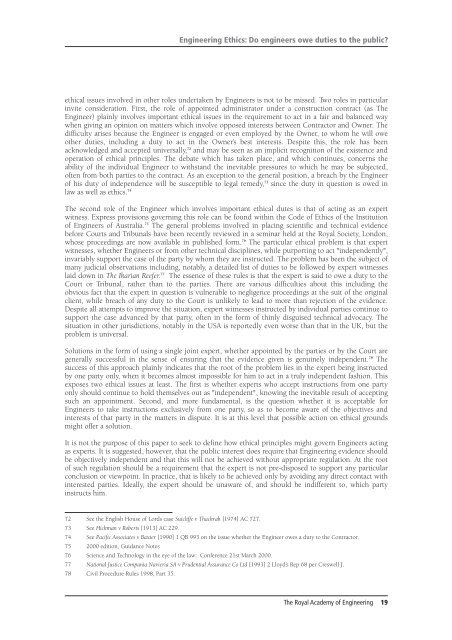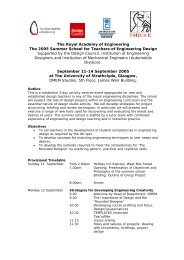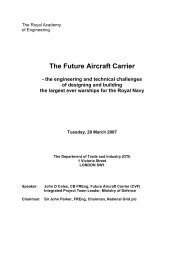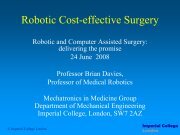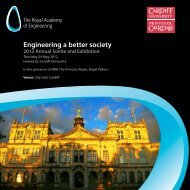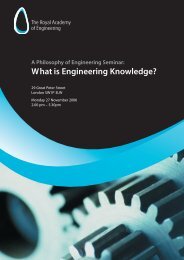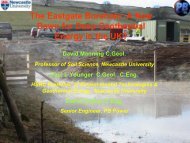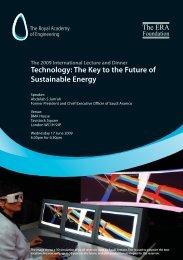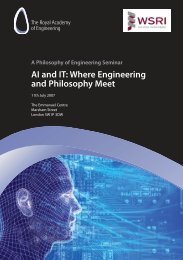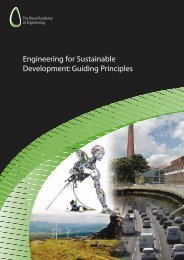Engineering Ethics: Do engineers owe duties to the
Engineering Ethics: Do engineers owe duties to the
Engineering Ethics: Do engineers owe duties to the
Create successful ePaper yourself
Turn your PDF publications into a flip-book with our unique Google optimized e-Paper software.
<strong>Engineering</strong> <strong>Ethics</strong>: <strong>Do</strong> <strong>engineers</strong> <strong>owe</strong> <strong>duties</strong> <strong>to</strong> <strong>the</strong> public?<br />
ethical issues involved in o<strong>the</strong>r roles undertaken by Engineers is not <strong>to</strong> be missed. Two roles in particular<br />
invite consideration. First, <strong>the</strong> role of appointed administra<strong>to</strong>r under a construction contract (as The<br />
Engineer) plainly involves important ethical issues in <strong>the</strong> requirement <strong>to</strong> act in a fair and balanced way<br />
when giving an opinion on matters which involve opposed interests between Contrac<strong>to</strong>r and Owner. The<br />
difficulty arises because <strong>the</strong> Engineer is engaged or even employed by <strong>the</strong> Owner, <strong>to</strong> whom he will <strong>owe</strong><br />
o<strong>the</strong>r <strong>duties</strong>, including a duty <strong>to</strong> act in <strong>the</strong> Owner’s best interests. Despite this, <strong>the</strong> role has been<br />
acknowledged and accepted universally, 72 and may be seen as an implicit recognition of <strong>the</strong> existence and<br />
operation of ethical principles. The debate which has taken place, and which continues, concerns <strong>the</strong><br />
ability of <strong>the</strong> individual Engineer <strong>to</strong> withstand <strong>the</strong> inevitable pressures <strong>to</strong> which he may be subjected,<br />
often from both parties <strong>to</strong> <strong>the</strong> contract. As an exception <strong>to</strong> <strong>the</strong> general position, a breach by <strong>the</strong> Engineer<br />
of his duty of independence will be susceptible <strong>to</strong> legal remedy, 73 since <strong>the</strong> duty in question is <strong>owe</strong>d in<br />
law as well as ethics. 74<br />
The second role of <strong>the</strong> Engineer which involves important ethical dutes is that of acting as an expert<br />
witness. Express provisions governing this role can be found within <strong>the</strong> Code of <strong>Ethics</strong> of <strong>the</strong> Institution<br />
of Engineers of Australia. 75 The general problems involved in placing scientific and technical evidence<br />
before Courts and Tribunals have been recently reviewed in a seminar held at <strong>the</strong> Royal Society, London,<br />
whose proceedings are now available in published form. 76 The particular ethical problem is that expert<br />
witnesses, whe<strong>the</strong>r Engineers or from o<strong>the</strong>r technical disciplines, while purporting <strong>to</strong> act "independently",<br />
invariably support <strong>the</strong> case of <strong>the</strong> party by whom <strong>the</strong>y are instructed. The problem has been <strong>the</strong> subject of<br />
many judicial observations including, notably, a detailed list of <strong>duties</strong> <strong>to</strong> be foll<strong>owe</strong>d by expert witnesses<br />
laid down in The Ikarian Reefer. 77 The essence of <strong>the</strong>se rules is that <strong>the</strong> expert is said <strong>to</strong> <strong>owe</strong> a duty <strong>to</strong> <strong>the</strong><br />
Court or Tribunal, ra<strong>the</strong>r than <strong>to</strong> <strong>the</strong> parties. There are various difficulties about this including <strong>the</strong><br />
obvious fact that <strong>the</strong> expert in question is vulnerable <strong>to</strong> negligence proceedings at <strong>the</strong> suit of <strong>the</strong> original<br />
client, while breach of any duty <strong>to</strong> <strong>the</strong> Court is unlikely <strong>to</strong> lead <strong>to</strong> more than rejection of <strong>the</strong> evidence.<br />
Despite all attempts <strong>to</strong> improve <strong>the</strong> situation, expert witnesses instructed by individual parties continue <strong>to</strong><br />
support <strong>the</strong> case advanced by that party, often in <strong>the</strong> form of thinly disguised technical advocacy. The<br />
situation in o<strong>the</strong>r jurisdictions, notably in <strong>the</strong> USA is reportedly even worse than that in <strong>the</strong> UK, but <strong>the</strong><br />
problem is universal.<br />
Solutions in <strong>the</strong> form of using a single joint expert, whe<strong>the</strong>r appointed by <strong>the</strong> parties or by <strong>the</strong> Court are<br />
generally successful in <strong>the</strong> sense of ensuring that <strong>the</strong> evidence given is genuinely independent. 78 The<br />
success of this approach plainly indicates that <strong>the</strong> root of <strong>the</strong> problem lies in <strong>the</strong> expert being instructed<br />
by one party only, when it becomes almost impossible for him <strong>to</strong> act in a truly independent fashion. This<br />
exposes two ethical issues at least. The first is whe<strong>the</strong>r experts who accept instructions from one party<br />
only should continue <strong>to</strong> hold <strong>the</strong>mselves out as "independent", knowing <strong>the</strong> inevitable result of accepting<br />
such an appointment. Second, and more fundamental, is <strong>the</strong> question whe<strong>the</strong>r it is acceptable for<br />
Engineers <strong>to</strong> take instructions exclusively from one party, so as <strong>to</strong> become aware of <strong>the</strong> objectives and<br />
interests of that party in <strong>the</strong> matters in dispute. It is at this level that possible action on ethical grounds<br />
might offer a solution.<br />
It is not <strong>the</strong> purpose of this paper <strong>to</strong> seek <strong>to</strong> define how ethical principles might govern Engineers acting<br />
as experts. It is suggested, h<strong>owe</strong>ver, that <strong>the</strong> public interest does require that <strong>Engineering</strong> evidence should<br />
be objectively independent and that this will not be achieved without appropriate regulation. At <strong>the</strong> root<br />
of such regulation should be a requirement that <strong>the</strong> expert is not pre-disposed <strong>to</strong> support any particular<br />
conclusion or viewpoint. In practice, that is likely <strong>to</strong> be achieved only by avoiding any direct contact with<br />
interested parties. Ideally, <strong>the</strong> expert should be unaware of, and should be indifferent <strong>to</strong>, which party<br />
instructs him.<br />
72 See <strong>the</strong> English House of Lords case Sutcliffe v Thackrah [1974] AC 727.<br />
73 See Hickman v Roberts [1913] AC 229.<br />
74 See Pacific Associates v Baxter [1990] 1 QB 993 on <strong>the</strong> issue whe<strong>the</strong>r <strong>the</strong> Engineer <strong>owe</strong>s a duty <strong>to</strong> <strong>the</strong> Contrac<strong>to</strong>r.<br />
75 2000 edition, Guidance Notes<br />
76 Science and Technology in <strong>the</strong> eye of <strong>the</strong> law: Conference 21st March 2000.<br />
77 National Justice Compania Navieria SA v Prudential Assurance Co Ltd [1993] 2 Lloyd’s Rep 68 per Creswell J.<br />
78 Civil Procedure Rules 1998, Part 35.<br />
The Royal Academy of <strong>Engineering</strong> 19


